Challenging the Obstacles by Patrick Lichty
Second Life® was very sexy in SL from 2006–2010. Educators thought it was the ‘proto-mooc.’ They went in, but hit the generational wall. Because SL isn’t a game, students were resistant. And, educators did leave when the non-profit tier was abolished. Rightly so. Some keep their campuses in SL, but mostly for presentation and marketing.
The current on-line model is the Mooc, which is also falling short of expectations. MOOCs are awful for culture, but administrators sell them as wonderful things because they spread out content in a globalist fashion. But education can’t be mechanized—it is personal and embodied. And it is evolving.
The biggest obstacles to this evolution are logistical. Technologies often create problems that require technological solutions, which creates other issues, which requires other solutions, so… we are evolving, but not always progressing. Imagine it like an exploration. Difficulties include:
1: The learning curve. Controllers like Kinect and Leap Motion will be useful. Also, Phil Rosedale’s HI Fidelity may be better. Unfortunately, it requires a headset, but I see that coming anyway. Steve Jobs was right: make the interface disappear.
2: Transparency. More connective interfaces will create better UX.
3: Perceptions. The answer to the generational issue that students want games may be to ‘gamily’ virtual learning. As much as I do not like Luminosity, they make a point. But by “optimizing brain function,” they never tell you how, and for what tasks your brain is getting boosted. IMO could be a ploy to create a more pliable workforce. I have a friend on the White House panel for Gaming and Culture. He works with psychologists developing simple card games that lower resistance to certain concepts and ideologies. This makes the user more pliable for the learning of certain content. Public relations, advertising, and propaganda are all forms of learning.
4. Management. The belief that the solution is technology-based, not human-centered is very important. The use of digital spaces are all about communication, psychology, and sociology, not media design. Administrators are largely so uncomprehending of these technologies; you really just need to make it look like something sexy that makes the school look more innovative, then just go do it. It isn’t so romantic as selling innovation and possibility. Well, maybe innovation, because that’s a key word in the institution, as it is about invention and monetization through retention.
EDUCATION VERSUS ENTREPRENEURIALISM
Entrepreneurism is a necessity, but morally I am against it. Capitalism has saturated everything so much that making money has overridden pursuits like creating cultural centers or open-source content. Entrepreneurism and innovation at the university level shift learning (metaphorically) from basic research (without a goal) to innovation (invention with problem solution/ monetization) in mind. But universities should be dedicated to basic research, as it turns the student from a learner into an intern. Once capitalism infuses everything (which Marx says it must do), the soul of the people will die. Culture has largely been non-profit, and higher education should be free as well.
Students are also concerned with return on investment, and I cannot blame them. You have to support yourself. But they have been defunded to the point where they have to take on 100K of loans just for a degree, which might be of use, and they’ll take thirty years to pay it back. And these are private loans. We need to get the public sector behind higher education again, and stop tax breaks for groups like the University of Phoenix.
A university should NOT be a business, but many have become them. You can have a trade renaissance without money— Thingiverse shows us this—the Art Institute of Chicago, Met, and Smithsonian are putting their 3D scans online—for free. Really, I’m a bit of a Social Democrat, believing in basic functions provided by the state, the rest driven by innovation. Education is a basic need that should be provided by the state.
The perception that art students will starve is the white lie people tell them, but current studies say that liberal arts graduates get more money long-term. They are more flexible, general, and adaptable. Many now say that the MFA is the new MBA because Advertising is King and art grads are great at thinking outside the box. —Patrick Lichty (Man Michinaga)
(Please see Patrick’s article in-world: “Laser Vision” where he shares his virtual world evolution.)
– – – – – – – – – – – – – – – – – – – – – – – – – – – – – – – – – – – – – – – – – – – – –
Advertising Opportunities
Sim Street Journal also supports several events:
ASN Photo Contest
UWA’s Freedom Project
Rose Theatre and Galleries
Book Island
– – – – – – – – – – – – – – – – – – – – – – – – – – – – – – – – – – – – – – – – – – – – –
PLEASE SEE THE IN-WORLD SPONSORS FOR SIM STREET JOURNAL #8
Enjoy different, but related, issue versions: online and in-world (available at the Second Life® SSJ office (Innu 40, 36, 1650) or here as a PDF: sim street journal #8.
Back issues are available on MARKETPLACE).
Contributions are encouraged if covering topics relevant to the real world readers.
– – – – – – – – – – – – – CONTACTS:
Sim Street Journal explores the relevance of virtual to real commerce and culture.
ONLINE: https://simstreetjournal.wordpress.com/
FACEBOOK: https://www.facebook.com/simstreetjournal
IN-WORLD: http://maps.secondlife.com/secondlife/Innu/40/36/1650
MARKETPLACE: https://marketplace.secondlife.com/stores/148961
EMAIL: simstreetjournal@gmail.com
Sim Street Journal explores the relevance of second to first life.
© 2014 by Eleanor Medier, Sim Street Journal. Articles cannot be reprinted without permission.
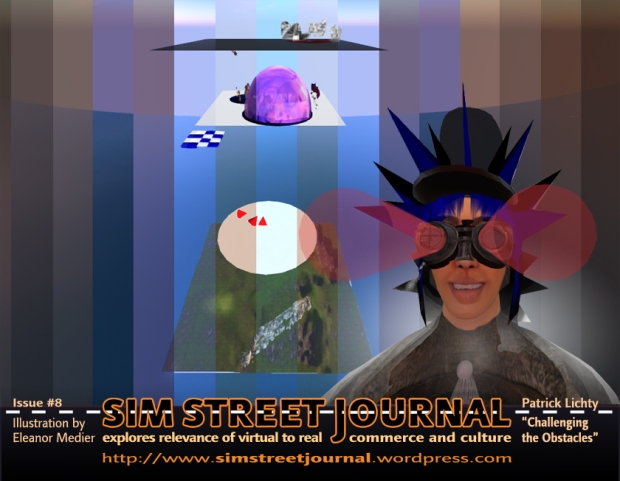
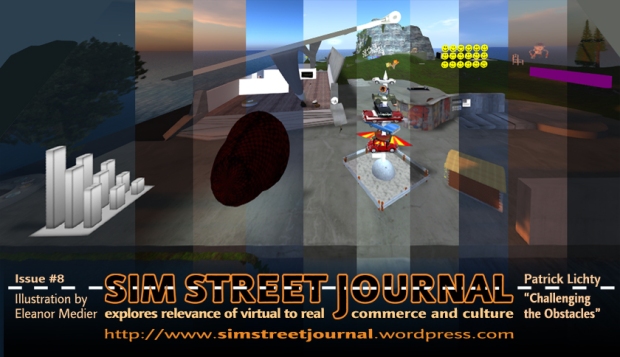
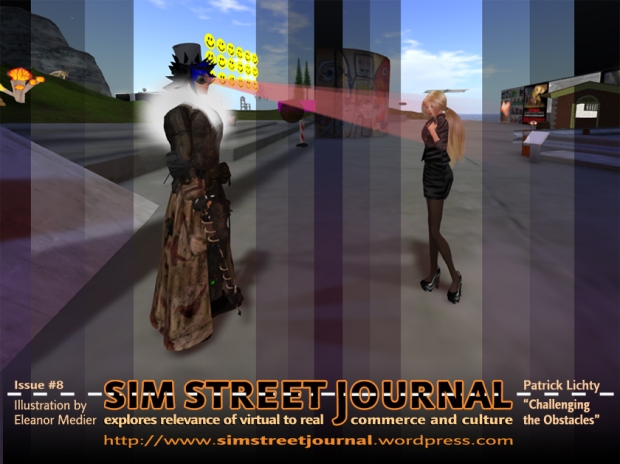
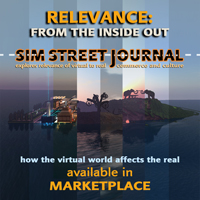
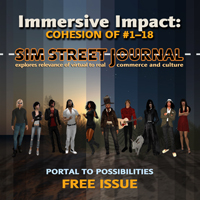








Education has always been about how to learn and use skills to survive in the real world. Capitalism, skipping over the intermediate steps like feudalism, allowed for a measure of relaxation from the hand to mouth experience, and allowed one to use their intellect for more than how to hunt down that next meal. It’s gotten to the point that we can think of more than the long term survival of our individual tribes or clans. We can now consider best how to keep our whole species alive for an indefinite future. Capitalism has always been an ideal from the furthest reaches of our history and probably prehistory. I defy one to argue this. The ones with power and wealth have footed the rise toward a higher technology, and the education needed to achieve it. The higher the technology, the more difficult it is to reach the next level. We have reached a plateau at this point, but still there are those who can think of ways to achieve a better way of using the technologies we have. Overall, the dreamers are working towards goals. Gamers are dreamers in a sense, always wanting to get to another level. Artists are always using technology in their crafts. Finding a new mediums to use or tools.
As for who should foot the bill for education, look around. Former students have to use the skills they learned. If they don’t become educators, they become technologists/engineers usually. Only giving service to those in power. Few continue to dream how to achieve the next level. Hopefully that will be enough to create a sea change in the human experience. We can continue to discuss narrow points of view and basic reasoning, but economics do come into play.
I suggest looking at the basic economics be a priority for the education community. The current level of value of our currencies has gotten out of hand, and there is now a real chance that we will slide backwards due to this, thus causing the number of dreamers to decline.